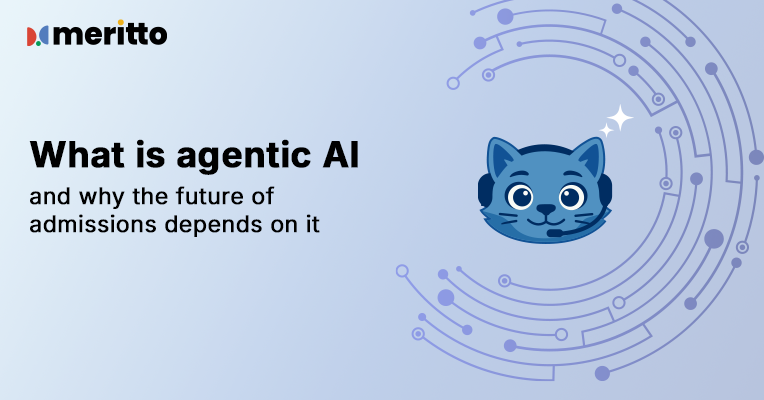In an era saturated with automation promises, the question is no longer “Do we need AI?” It’s “What kind of AI will actually move us forward?” Traditional AI tools—rule-based chatbots, scripted automations, decision trees—have served their time. They helped reduce basic workload and digitize access. But in a landscape where student expectations evolve faster than enrollment cycles, these tools are no longer keeping up.
That’s because they were designed to respond, not to reason. To react, not to reshape. And this is precisely where Agentic AI enters, not as an upgrade, but as a redefinition.
What is agentic AI, really?
Agentic AI refers to a new class of artificial intelligence that possesses the autonomy, context-awareness, and adaptive reasoning to act as a goal-oriented collaborator, not just a programmatic responder. Rather than relying on linear scripts, Agentic AI:
- Understands context dynamically: conversations don’t reset; they evolve.
- Initiates action based on data, behavior, and anticipated needs.
- Learns continuously, improving its relevance and accuracy with each interaction.
- Works toward defined outcomes, like increasing application completions or reducing support backlog.
In essence, this is AI that doesn’t wait to be told what to do. It acts in service of your institutional goals, intelligently and independently.
Why agentic AI is no longer optional for admissions
Let’s be clear: the expectations placed on admissions teams today are immense. They are required to deliver:
- Instant engagement across channels
- Hyper-personalized student experiences
- Operational efficiency at scale
- Insightful reporting on student behavior and team performance
All while managing thousands of inquiries, forms, follow-ups, and interventions, most of which are still repetitive, time-sensitive, and low-value. Agentic AI addresses this reality not by doing more of the same faster, but by thinking differently. It turns every incoming student question into an opportunity to:
- Accelerate enrollments
- Personalize engagement at scale
- Preempt drop-offs
- And free up human teams for strategic work
This is not a chatbot revolution. It’s a cognitive evolution.
Mio AI: Built for education, meant for impact
At Meritto, we didn’t set out to build another assistant. We built Mio AI to be the first truly Agentic AI designed for education—pre-trained, multi-lingual, brand-aware, and relentlessly outcome-driven. Mio is not just integrated into your student touchpoints; it orchestrates them.
- On your website, it greets prospective students with intelligent, intent-aware conversations that reflect your institution’s voice.
- Inside the application portal, it guides applicants with personalized nudges, closing knowledge gaps before they become drop-offs.
- In your CRM, it auto-captures, classifies, and syncs data, so your teams don’t have to.
Mio learns from Core, the institution’s evolving knowledge hub, and reports through Insights, providing leaders with granular visibility into query trends, resolution effectiveness, and student sentiment. It does all this without requiring code, configuration, or re-training cycles. Because Agentic AI doesn’t need to be told what to do, it learns what needs to be done.
The strategic gains of going agentic
When institutions adopt Agentic AI like Mio, they don’t just “automate processes.” They redefine what’s possible across the student lifecycle:
- Operational agility: Reassign human bandwidth from repetitive support to strategic decision-making.
- Experience transformation: Deliver a truly personalized, 24/7 student journey that reflects your institutional ethos.
- Insight-led leadership: Move from assumptions to intelligence, powered by real-time engagement data.
- Scalable trust: Ensure that no student query goes unanswered, no opportunity is missed, and no touchpoint feels transactional.
Agentic AI doesn’t just improve how your teams work. It changes what your teams are free to work on.
The question isn’t “When” It’s “Who Leads”
AI in education is no longer a vision of tomorrow. It’s a strategic advantage today, but only if deployed with intent. The leap from automation to agency is what separates forward-moving institutions from those merely keeping up. And the future will belong to those who build with intelligence—not just around their students, but with them in mind.
So ask yourself, not whether you need AI. But whether you’re ready for an AI that can think, act, and evolve like a teammate.
